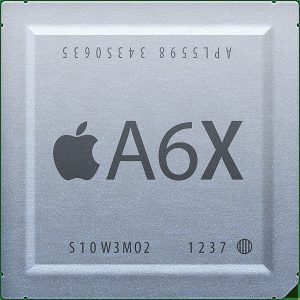
Industry sources claim Apple could begin sourcing its A-series mobile processors from Taiwan Semiconductor Manufacture Company sometime in 2013, according to DigiTimes. The prospects of such a move are a concern for TSMC's other major clients, including Qualcomm, NVIDIA, Broadcom, and Altera, as Apple's SoC needs could swallow up a big portion of TSMC's production capacity.
Samsung is currently the sole source for the A5, A6, and A6X processors used in Apple's mobile devices. Despite the five-year history of Samsung as a major supplier for Apple, the relationship between the two companies has been strained by a steady stream of litigation over smartphone designs and patents.
Rumors began surfacing over a year ago that Apple was considering TSMC as a manufacturing partner for its custom, ARM-based processor designs. One potential problem with that move at the time was that Apple's earlier A4 and A5 processors were based on designs by Intrinsity. Though Apple acquired Intrinsity in 2010, those earlier designs had input from Samsung, and may have included some intellectual property from Samsung that Apple couldn't take to TSMC.
However, Apple's A6 and A6X processors include cores that were custom-designed by Apple itself. While Apple has successfully transitioned from Samsung's 45nm process to a lower-power 32nm process for its latest processors, Apple has reportedly been testing production of the A6 on TSMC's advanced 28nm process over the last year. The 28nm process would yield yet more power savings for Apple, a particularly important consideration for its ever-thinner mobile devices. (And, a process shrink is the only likely way Apple will be able to shave any weight off its full-size Retina iPad for the foreseeable future.)
NVIDIA and Qualcomm in particular are large customers of TSMC's 28nm fab capacity. Unsurprisingly, these and other fabless semiconductor designers are concerned that Apple's potentially huge demand—as many as 200 million SoCs per year by some estimates—could mean other clients could be sitting waiting for chips while TSMC pumps out A6 processors for Apple's next iPhone or iPad.
"It appears more likely that TSMC will start producing chips for Apple's next iOS devices in 2013," according to DigiTimes' report. "Demand from Apple is expected to be huge, said the observers, adding that allocation of TSMC's available advanced process capacity among its major clients will be a critical decision to be made by the foundry."
TSMC recently rebuffed attempts from both Apple and Qualcomm to gain exclusive access to its fab capacity, despite offers that reportedly exceeded $1 billion. The company was concerned that locking up capacity could be too risky, though it did say it may consider dedicating one or two fabs to certain clients.
The decision to do so would not come lightly, however. "You have to be careful," TSMC CFO Lora Ho told Bloomberg in August. "Once that product migrates, what are [we] going to do with that dedicated fab? We would like to keep the flexibility."
As we noted in August, Apple may be interested in transitioning to TSMC to reduce its reliance on Samsung—a sometime bitter rival in the mobile space—as a supplier. Or, it may be hoping to spread its demand for processors around a bit. Either way, it seems more and more likely that TSMC will count Apple as a major client in the near future—TSMC is the only other supplier that could meet Apple's demand outside of Samsung or, more remotely, Intel.
If Apple is willing to write a big enough check—it does have $121 billion in the bank, after all—it may just be able to persuade TSMC to dedicate its upcoming Fab 14, which is expected to come online for volume production in late 2013. That facility will be dedicated to a new 20nm process and an advanced 16nm FinFET process (the latter similar to Intel's 3D Tri-Gate transistors). Apple is rumored to be planning a quad-core processor design destined for TSMC's 20nm process, which may already be in trial production this month.
reader comments
75